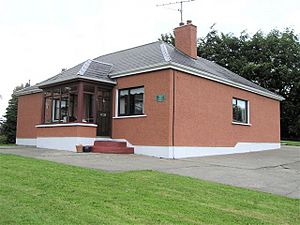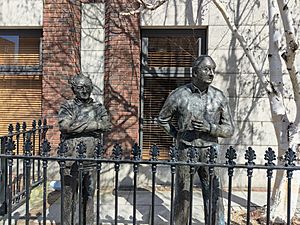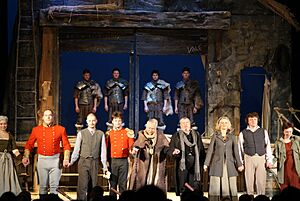Brian Friel facts for kids
Quick facts for kids
Brian Friel
|
|
|---|---|
 |
|
| Born | Brian Patrick Friel c. 9 January 1929 Omagh, County Tyrone, Northern Ireland |
| Died | 2 October 2015 (aged 86) Greencastle, County Donegal, Ireland |
| Education | St Patrick's College, Maynooth (BA, 1949) St. Joseph's Training College, Belfast (1950) |
| Alma mater | St Columb's College |
| Notable works | Philadelphia, Here I Come! (1964) Faith Healer (1979) Translations (1980) Dancing at Lughnasa (1990) |
| Notable awards | • Tony Award Nominations: Philadelphia, Here I Come! (1966) Lovers (1969) • NY Drama Critics Circle Award (1989) • Olivier Award (1991) • Writers' Guild of Britain Award (1991) • Tony Award for Best Play for Dancing at Lughnasa (1992) • Saoi of Aosdána (2006) |
| Spouse |
Anne Morrison
(m. 1954–2015) |
| Children | Five |
Brian Patrick Friel (born around 9 January 1929 – died 2 October 2015) was a famous Irish writer. He wrote plays and short stories. He also helped start the Field Day Theatre Company. Many people thought he was one of the best English-language playwrights of his time.
People often called him the "Irish Chekhov" because his plays were similar to Chekhov's. He was also known as "the voice of Ireland." His plays were as good as those by other great writers like Samuel Beckett and Arthur Miller.
Brian Friel wrote 24 plays during his career, which lasted over 50 years. Some of his most famous early works include Philadelphia, Here I Come! and Faith Healer. He was given a special honor called Saoi by Aosdána, a group of Irish artists. His plays were often performed in New York City, Ireland, and the UK.
In 1980, Friel helped create the Field Day Theatre Company. Their first play was his own work, Translations. He worked with Seamus Heaney, who later won the Nobel Prize in Literature. They became friends after Friel wrote to Heaney about his poetry book.
Friel was also a member of important groups like the American Academy of Arts and Letters. He even served in the Seanad Éireann, which is like the Irish Senate, from 1987 to 1989. Later in his career, his play Dancing at Lughnasa became a huge success. It won several awards, including a Tony Award for Best Play. This play was also made into a movie starring Meryl Streep.
Contents
Brian Friel's Life

Brian Friel was born in 1929 in Knockmoyle, County Tyrone, Northern Ireland. His family later moved to Killyclogher, near Omagh. While his birth date is usually given as January 9, some records show January 10. He was known as Brian Friel and celebrated his birthday on January 9.
His father, Patrick Friel, was a primary school teacher. He later became a local council member in Derry. Brian's mother, Mary, worked as a postmistress in Glenties, County Donegal. When Brian was ten, his family moved to Derry. He went to St Columb's College there, the same school as other famous people like Seamus Heaney.
Brian Friel studied at St Patrick's College, Maynooth and became a teacher in Belfast. From 1950 to 1960, he taught math in schools in Derry. In 1954, he married Anne Morrison. They had four daughters and one son. In 1960, he decided to become a full-time writer, using his savings to support himself. Later, the Friels moved to Greencastle, County Donegal.
Brian Friel supported the idea of Irish nationalism, which means he believed in Ireland being an independent country. He was a member of the Nationalist Party.
After a long illness, Brian Friel passed away on October 2, 2015, in Greencastle, County Donegal. He is buried in the cemetery in Glenties. He was survived by his wife, Anne, and their children Mary, Judy, Sally, and David. Another daughter, Patricia, had passed away before him.
His Writing Career
Many of Brian Friel's plays are set in or around a made-up town called "Ballybeg". This name comes from an Irish phrase meaning "Small Town." Fourteen of his plays take place in Ballybeg. These plays show how rural Irish society changed over time. For example, Philadelphia, Here I Come! (1964) shows a small, isolated town. Later plays like Molly Sweeney (1994) show a more modern, multicultural town with health clubs and flights to big cities.
Early Works (1959 – 1975)
Friel's first radio plays were broadcast by the BBC in 1958. He started writing short stories for The New Yorker magazine in 1959. He then published two popular collections of stories. His first stage play, A Doubtful Paradise, was performed in 1960. Friel also wrote many articles for The Irish Press, a newspaper in Dublin. These articles included short stories, political opinions, and memories of his childhood.
One of Friel's early plays, The Enemy Within (1962), was successful. Another play, The Blind Mice (1963), was very popular and performed many times. In the early 1960s, Friel spent some time at the Guthrie Theater in Minneapolis, USA. He said this experience gave him "courage and daring" to try new things in his writing.
Soon after returning, Friel wrote Philadelphia Here I Come! (1964). This play made him famous in Dublin, London, and New York. Other successful plays followed, like The Loves of Cass McGuire (1966) and Lovers (1967). Even with his success in plays, Friel still saw himself mainly as a short story writer at this time.
Later, Friel wrote plays that looked at the politics of the day. The Mundy Scheme (1969) and Volunteers (1975) were sharp, sometimes bitter, satires about the Irish government. Volunteers used an archaeological dig as a way to talk about how Irish history was sometimes changed to fit political needs.
In 1968, Friel lived in Derry City, a place where the Irish Civil Rights Movement was very active. Events like the Battle of the Bogside inspired him to write The Freedom of the City. Friel himself took part in a protest that became known as Bloody Sunday in 1972. He said that being shot at by British soldiers during this event deeply affected his writing of The Freedom of the City.
Later Works (1976 – 1989)
By the mid-1970s, Friel started writing plays that focused more on family relationships. These plays were often compared to the work of Chekhov. Living Quarters (1977) was a modern retelling of an old Greek myth. Aristocrats (1979) looked at a once-powerful family losing its money, which might have actually freed them from old traditions.
Aristocrats was one of three important plays that defined Friel's career. The others were Faith Healer (1979) and Translations (1980). Faith Healer tells the story of a traveling healer through four different monologues. Friel often used experimental techniques in his plays, like having characters split into two actors or showing dead characters. These ideas were fully developed in Faith Healer.
Translations first opened in 1980 in Derry. It starred famous actors like Stephen Rea and Liam Neeson. The play is set in 1833 and explores language, the meeting of Irish and English cultures, and the changing of Irish place names to English ones. It was an instant success. The play cleverly shows two groups of people who can barely talk to each other because they speak different languages. Translations became one of the most performed plays of the late 20th century, shown all over the world.
Even with his growing fame, the 1980s were a quiet time for Friel in terms of new plays. He spent time managing the Field Day Theatre Company and worried about putting too much politics into his work. During this time, he also translated some of Chekhov's plays and adapted other novels for the stage. Friel eventually decided to premiere Dancing at Lughnasa at the Abbey Theatre instead of with Field Day, and he left Field Day in 1994.
Success in the 1990s and Beyond (1990 – 2005)
Brian Friel became a dominant force in Irish theater again in the 1990s, especially with Dancing at Lughnasa. This play, partly inspired by his mother and aunts, is set in 1936. It became incredibly successful, moving from the Abbey Theatre to London's West End and then to Broadway. On Broadway, it won three Tony Awards in 1992, including Best Play. A movie version, starring Meryl Streep, soon followed.
Friel continued to write, though some plays were less successful than Dancing at Lughnasa. Wonderful Tennessee (1993) tells the story of three couples trying to return to a pilgrimage site. Give Me Your Answer Do! (1997) explores the lives of two novelist friends who chose different writing paths.
As Friel got older, he wrote fewer full-length plays. Between 1997 and 2003, he mainly produced short one-act plays. These included "The Yalta Game" (2001) and "Afterplay" (2002), which showed his continued interest in Chekhov's work. "Afterplay" imagines a meeting between characters from two of Chekhov's plays.
One of his most creative works from this later period was Performances (2003). It features a student talking with a composer who appears to her after his death, while a string quartet plays music. Friel's last full-length play was The Home Place (2005). This play was set in Ballybeg and looked at the Protestant experience in Ireland in the late 1800s. After a successful run in Dublin and London, it also played in the United States.
List of Works
- A Sort of Freedom (radio play, 1958)
- To This Hard House (radio play, 1958)
- A Doubtful Paradise (1960)
- The Enemy Within (1962)
- The Blind Mice (1963)
- Philadelphia, Here I Come! (1964)
- The Founder Members (TV play, 1964)
- Three Fathers, Three Sons (TV play, 1964)
- The Loves of Cass McGuire (1966)
- Lovers: Winners and Losers (1967)
- Crystal and Fox (1968)
- The Mundy Scheme (1969)
- Winners (1970)
- The Gentle Island (1971)
- The Freedom of the City (1973)
- Volunteers (1975)
- Farewell to Ardstraw (BBC TV play, 1976)
- The Next Parish (BBC TV play, 1976)
- Living Quarters (1977)
- Faith Healer (1979)
- Aristocrats (1979)
- Translations (1980)
- Three Sisters (Anton Chekhov translation, 1981)
- American Welcome (7-minute one-act play, 1981)
- The Communication Cord (1982)
- Fathers and Sons (Ivan Turgenev adaptation, 1987)
- Making History (1988)
- Dancing at Lughnasa (1990)
- The London Vertigo (Charles Macklin adaptation, 1991)
- A Month in the Country (Turgenev adaptation, 1992)
- Wonderful Tennessee (1993)
- Molly Sweeney (1994)
- Give Me Your Answer, Do! (1997)
- Uncle Vanya (Chekhov adaptation, 1998)
- The Yalta Game (one-act Chekhov adaptation, 2001)
- The Bear (one-act Chekhov adaptation, 2002)
- Afterplay (one-act play, 2002)
- Performances (70-minute one-act play, 2003)
- The Home Place (2005)
- Hedda Gabler (Henrik Ibsen adaptation, 2008)
Awards and Honors
Taoiseach Charles Haughey (the head of the Irish government) chose Friel to be a member of Seanad Éireann (the Irish Senate) in 1987. He served there until 1989. In 1989, BBC Radio dedicated a "Brian Friel Season" to his work, playing six of his plays. He was the first living playwright to receive such an honor.
In 1999, to celebrate Friel's 70th birthday, a "Friel Festival" was held in Dublin. Ten of his plays were performed, and there were exhibitions and talks about his work. In the same year, The Irish Times newspaper gave him a lifetime achievement award.
On February 22, 2006, the President of Ireland, Mary McAleese, gave Friel a special gold necklace called a torc. This was to honor his election as a Saoi by his fellow members of Aosdána. At the time, only five members of Aosdána could hold this honor. Friel joined other famous artists like Seamus Heaney.
In November 2008, Queen's University of Belfast announced they would build a new theater and research center named The Brian Friel Theatre and Centre for Theatre Research. Friel attended its opening in 2009.
When Friel turned 80 in 2009, many celebrations took place. The Gate Theatre staged three of his plays. The Abbey Theatre held a "Birthday Celebration for Brian Friel," where excerpts from his plays were read, and songs were performed. Friel attended the event and mingled with well-wishers.
List of Major Awards
- 1988 Evening Standard Award for Best Play – Aristocrats
- 1989 New York Drama Critics Circle Award for Best Foreign Play – Aristocrats
- 1991 Laurence Olivier award for Best Play – Dancing at Lughnasa
- 1992 New York Drama Critics Circle award for best play– Dancing at Lughnasa
- 1992 Tony awards, including Best Play – Dancing at Lughnasa
- 1995 New York Drama Critics Circle award for best foreign play – Molly Sweeney
- 2006 Induction into the American Theater Hall of Fame
- 2009 UCD Ulysses Medal
- 2010 Donegal Person of the Year
- Member of the American Academy of Arts and Letters
- Member of the British Royal Society of Literature
- Member of the Irish Academy of Letters
Legacy

The National Library of Ireland keeps a large collection of Brian Friel's papers. These include his notebooks, manuscripts, letters, photos, and other materials related to his writing career from 1959 to 2010. These papers help people learn about his creative process and his life.
See also
 In Spanish: Brian Friel para niños
In Spanish: Brian Friel para niños
- List of Irish writers
 | Chris Smalls |
 | Fred Hampton |
 | Ralph Abernathy |


